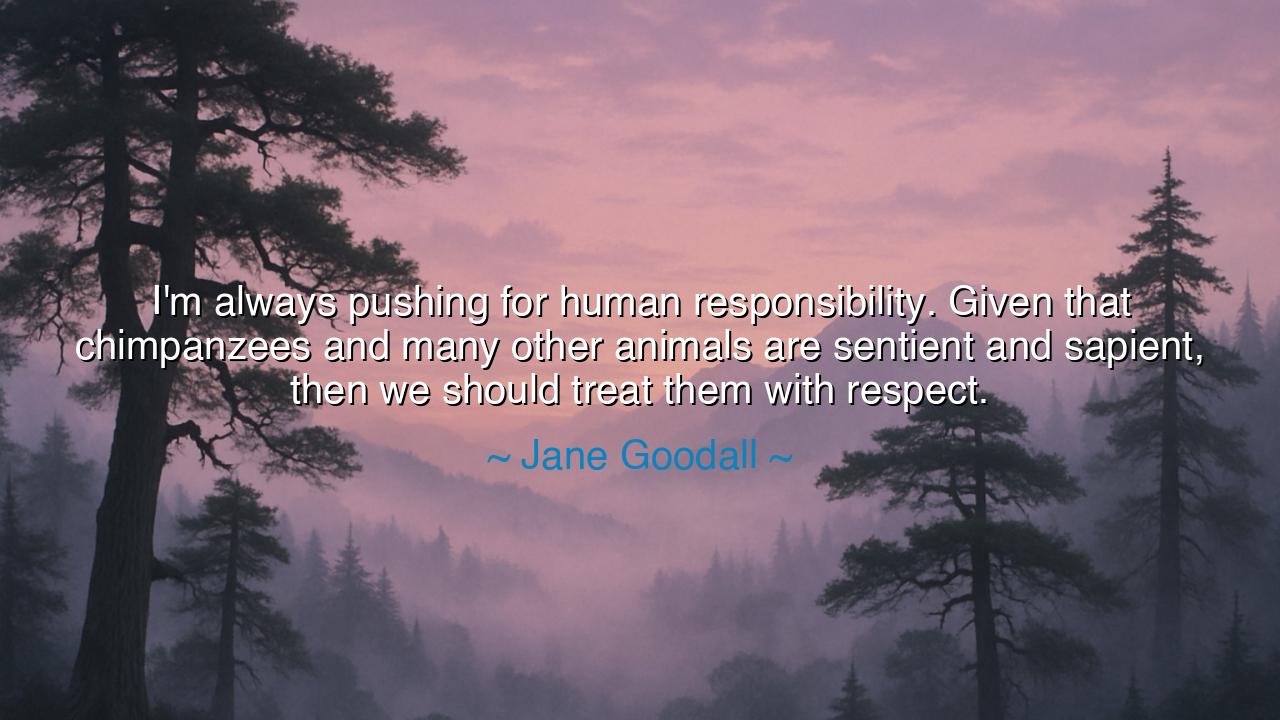
I'm always pushing for human responsibility. Given that
I'm always pushing for human responsibility. Given that chimpanzees and many other animals are sentient and sapient, then we should treat them with respect.






Hear, O children of earth, the voice of Jane Goodall, who declared: “I’m always pushing for human responsibility. Given that chimpanzees and many other animals are sentient and sapient, then we should treat them with respect.” These words come not from theory alone, but from a lifetime spent among the forests, listening to the songs and cries of creatures who share with us the breath of life. They are a summons to humility, a call for humans to awaken from arrogance, and to see that we are not lords alone upon the earth, but stewards entrusted with the care of all living beings.
The origin of this truth lies in Goodall’s work in Gombe, Tanzania, where she spent years observing chimpanzees in their natural habitat. She saw them craft tools, cradle their young, mourn their dead, and wage wars of their own. She discovered, to the world’s astonishment, that these beings long dismissed as “beasts” were not only sentient, capable of feeling, but also sapient, capable of thought, choice, and culture. With this revelation, the boundary that mankind had drawn between itself and the rest of creation began to blur. Goodall’s words emerged from this awakening: that with knowledge comes responsibility, and with responsibility comes the sacred duty of respect.
To recognize the sentience of another is to admit their capacity for suffering and joy. To recognize their sapience is to acknowledge their capacity for memory, decision, and even moral choice. Thus, when Goodall proclaims that we must treat them with respect, she speaks not of sentimentality but of justice. To ignore their capacities is to cloak ourselves in willful blindness; to acknowledge them is to extend the circle of morality beyond the narrow walls of our own species.
History bears witness to the danger of failing this responsibility. Recall the slaughter of the American bison, once numbering in millions, reduced to near extinction by human greed. The tribes who lived alongside these creatures saw them as sacred partners in survival; the newcomers saw them as profit and sport. The devastation that followed was not only ecological but spiritual, for in destroying the bison, mankind wounded itself. In the same way, to dismiss the dignity of chimpanzees, elephants, dolphins, or other sapient creatures is to impoverish our own humanity.
And yet, there are also stories of redemption. In India, the emperor Ashoka, once a ruthless conqueror, experienced remorse after bloody wars. He decreed protections for animals, forbidding needless slaughter and urging compassion toward all sentient beings. In his change of heart, the empire itself was transformed. So too, Goodall’s call for human responsibility is not a burden meant to weaken us, but a path to renewal—a way to restore balance between mankind and the living world.
The deeper meaning of her words is this: that the measure of humanity is not in our power over the weak, but in our care for them. To extend respect to animals is to enlarge our own souls, to learn humility in the presence of beings who share our earth and our essence. It is to recognize that we are not alone, but part of a greater community of life. To exploit them is to betray that community; to honor them is to fulfill our place within it.
Therefore, O listeners, let your actions be clear: live with responsibility toward the earth and its creatures. Refuse cruelty, whether in the marketplace, the laboratory, or the wild. Support the protection of habitats, honor the dignity of animals, and teach your children that compassion is not weakness but strength. For every act of kindness toward another being, no matter how small, is a step toward restoring the harmony of creation.
Thus let Goodall’s words endure: “Chimpanzees and many other animals are sentient and sapient—then we should treat them with respect.” Carry this teaching as a lamp in your heart, for when humanity learns to respect even the smallest of its fellow beings, then and only then shall it prove itself worthy of the stewardship of the earth.






AAdministratorAdministrator
Welcome, honored guests. Please leave a comment, we will respond soon